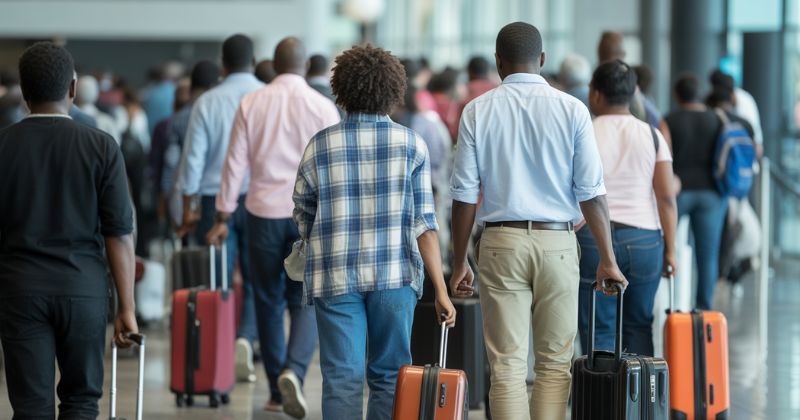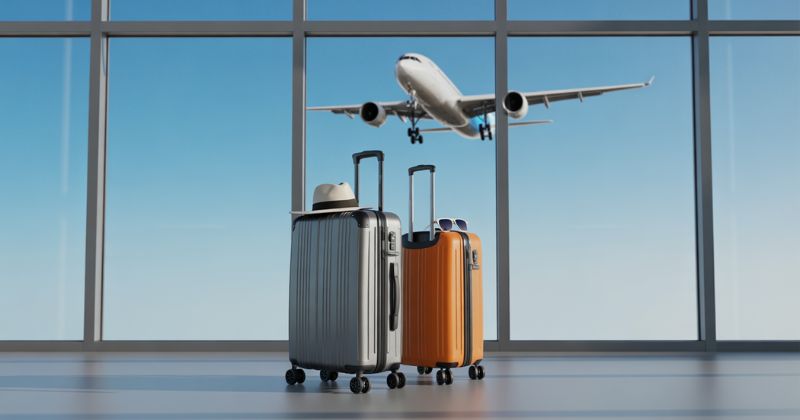
South African travellers have suffered a notable setback, as the country has fallen out of the global top fifty passports. According to the most recent Henley Passport Index, South Africa now ranks 53rd, a drop from its previous position of 48th. This decline highlights a reduction in global mobility for South African citizens, who now have visa-free or visa-on-arrival access to fewer destinations than before.
Key Takeaways
- South Africa drops out of top 50 passports: The country has fallen from 48th to 53rd place on the Henley Passport Index after losing visa-free access to Somalia, reducing its total to 102 destinations.
- Global mobility increasingly competitive: Other nations continue to strengthen travel agreements while South Africa’s progress has stalled, making it harder for citizens to travel freely and affecting tourism and business mobility.
- Improved diplomacy can restore ranking: Experts believe South Africa can regain its position by negotiating new visa-waiver deals, especially with Latin American and Asian countries, to expand global access and strengthen international relations.
About Arcadia Finance
Borrow smarter with Arcadia Finance. Access 19 fully NCR-registered lenders, skip the application fees, and enjoy a seamless, trustworthy loan process built for you.
Understanding the Henley Passport Index
The Henley Passport Index assesses the strength of 199 passports by comparing the number of destinations that passport holders can enter without a prior visa. A passport receives one point for every country that allows entry without a visa, as well as for destinations that provide a visa on arrival, an electronic travel authorisation (ETA), or a visitor’s permit upon entry. However, if a traveller must apply for an electronic visa before travelling, or if any form of pre-departure government authorisation is needed, that destination does not count towards the total score.
This ranking method provides an objective measure of travel freedom, illustrating how global relationships and diplomatic agreements shape mobility rights for each nation. Travel experts often refer to the Henley Index as a “snapshot of soft power,” since it reflects how well-connected a country is politically and economically. In other words, the more global trust a nation earns, the stronger its passport becomes.

South Africa’s Decline in Passport Power
In 2024, South Africa made headlines when it briefly entered the top 50, marking a moment of optimism for frequent travellers and business professionals. However, that progress has now been reversed. The number of countries offering visa-free access to South Africans has slipped from 103 to 102, pushing the nation down to 53rd place globally.
Although the decline appears small, it reflects an increasingly competitive environment in which other nations continue to expand their visa agreements, while South Africa’s mobility remains relatively static. South Africa now trails behind Qatar, which offers its citizens visa-free access to 111 countries, leaving a nine-point difference between the two.
The drop signals that South African passport holders face growing administrative burdens when travelling abroad, affecting tourism, international business, and cross-border collaboration. Analysts note that the downgrade also impacts foreign perception, as countries with lower passport rankings often face stricter scrutiny in airports, longer queues, and more complicated visa interviews. For South Africans planning holidays or business trips, that translates to more paperwork, higher costs, and longer waiting times.
Global Passport Rankings: Who Leads and Who Lags
At the top of the global leaderboard, Singapore maintains its position as the world’s most powerful passport, granting visa-free entry to 193 destinations. Close behind is South Korea, whose citizens enjoy access to 190 countries, while Japan follows with 189.
A five-way tie occurs for fourth place, with Germany, Spain, Switzerland, Italy, and Luxembourg each enjoying access to 188 destinations, underscoring the continued dominance of European nations in global travel freedom.
In stark contrast, Afghanistan continues to hold the world’s weakest passport, providing visa-free access to only 24 countries, narrowly trailing Syria, whose citizens can visit 26 countries without a visa. These figures highlight the global disparity in travel freedom, influenced by diplomatic relations, security concerns, and international cooperation.
Another striking shift involves the United States, which, for the first time in two decades, has fallen out of the top ten. Analysts attribute this decline to increasingly restrictive immigration and travel policies, which have eroded reciprocal visa agreements and limited its global mobility advantage.
Note that Japan held the top spot for five straight years before being overtaken by Singapore, a testament to how small policy tweaks and new partnerships can completely change a country’s travel freedom in just one update.
Where South Africa Lost Ground: The Somalia Case
South Africa’s slip in ranking stems from the loss of visa-free access to Somalia, a change brought about by the East African nation’s decision to implement a new electronic visa (eVisa) system.
The Somalian Immigration and Citizenship Agency officially introduced the digital visa process on 1 September 2025, replacing the previous visa-on-arrival policy. Under the new system, travellers are required to obtain approval before departing for Somalia.
Officials explained that the platform had been under development for some time, designed to modernise and streamline the visa process by allowing travellers to apply online from anywhere in the world. The system aims to deliver faster decisions and greater efficiency. However, for South Africans and other travellers accustomed to the flexibility of obtaining visas at the border, this shift represents a significant loss of convenience.
Previously, South African passport holders could arrange last-minute trips, complete visa formalities at airports or border crossings, and enter Somalia without prior documentation. The eVisa framework now demands pre-travel approval, removing the spontaneity once associated with regional travel.
In addition, the system offers limited recourse for travellers facing unexpected issues. If an eVisa application is denied, the traveller cannot board their flight, and any application fees paid are non-refundable.
While these changes have created frustration for some, Somali authorities maintain that the new digital system will enhance border control and improve national security. It also allows for better monitoring of visitor movement and ensures that all visa-related fees are properly channelled into government revenue systems.
Certain travellers remain exempt from the requirement, including diplomats, holders of multiple-entry visas, residents, United Nations laissez-passer holders, and citizens of nations with specific visa-free agreements. Nonetheless, the overall effect has been a tightening of entry procedures for ordinary travellers, including South Africans.
Travel tip: when applying for eVisas to African or Middle Eastern countries, always double-check official government portals instead of third-party sites, as fraudulent visa services have grown in number. Many South Africans have lost money to fake “express approval” websites promising quick access.

Remaining Destinations Open to South Africans
Despite the recent downgrade, South African passport holders still enjoy access to a wide array of visa-free destinations across Africa, Asia, the Americas, Europe, and Oceania. Popular travel spots such as Mauritius, Thailand, Singapore, South Korea, and Brazil remain accessible without prior visa applications.
Across the African continent, South Africans can still travel visa-free or with a visa on arrival to countries such as Kenya, Tanzania, Namibia, Botswana, and Zambia. Within the Americas, destinations like Brazil, Argentina, and Belize remain open. In Asia, travellers can still enjoy easy access to Malaysia, Indonesia, Philippines, and Thailand, while the Caribbean continues to offer numerous welcoming options including Barbados, St. Lucia, and Trinidad and Tobago.
Even though the total count has decreased slightly to 102 visa-free or visa-on-arrival destinations, these still offer considerable travel opportunities, especially for tourism and regional business ventures.
Fun fact: South Africa has one of the most travel-friendly passports in Africa, second only to Seychelles and Mauritius. This means South Africans still have significantly more freedom than most citizens on the continent, especially in regional travel and tourism. Another tip: always check the latest advisory list from the Department of International Relations before booking, as visa policies can change mid-year without public notice.
Conclusion
South Africa’s slide from 48th to 53rd on the Henley Passport Index underscores the fragile nature of international travel freedom. As other nations continue to strengthen diplomatic ties and streamline their visa agreements, South Africa faces growing challenges in maintaining its global mobility ranking.
The loss of visa-free access to Somalia, while seemingly minor, highlights the broader trend of tightening border controls and shifting global immigration policies. Although South Africans still enjoy access to over a hundred destinations, the latest development serves as a reminder that international standing in global mobility depends heavily on proactive diplomacy, consistent security cooperation, and the ongoing renewal of bilateral agreements.
Fast, uncomplicated, and trustworthy loan comparisons
At Arcadia Finance, you can compare loan offers from multiple lenders with no obligation and free of charge. Get a clear overview of your options and choose the best deal for you.
Fill out our form today to easily compare interest rates from 19 banks and find the right loan for you.


